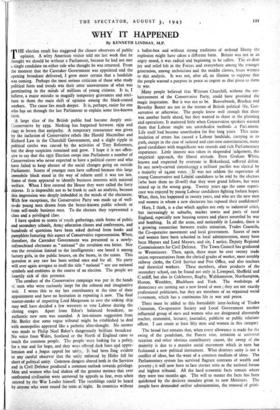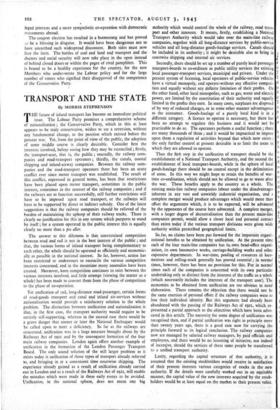WHY IT HAPPENED
By KENNETH LINDSAY, M.P.
THE election result has staggered the closest observers of public opinion. A witty American visitor told me last week that he thought we should be without a Parliament, because he had not met a single candidate on either side who thought he was returned. From the moment that the Caretaker Government was appointed and the opening broadcast delivered, I grew more certain that a landslide was coming. Perhaps the most serious criticism of those who study political form and trends was their utter unawareness of what was germinating in the minds of millions of young citizens. It is, I believe, a major mistake to magnify temporary grievances and attri- bute to them the main shift of opinion among the black-coated workers. The cause lies much deeper. It is, perhaps, easier for one who has sat through the last Parliament to explain some less-known t acts.
A large slice of the British public had become deeply anti- Conservative by 1939. Nothing has happened between 1939 and 1945 to lessen that antipathy. A temporary reassurance was given by the inclusion of Conservative rebels like Harold Macmillan and Richard Law in the Churchill Government, and a slight ripple in political circles was caused by the activities of Tory Reformers, but the deep suspicion remained and grew. I hope it is not offen- sive to say that the 1931 Election swept into Parliainent a number of Conservatives who never expected to have a political career and who have failed to keep abreast of the social changes going on outside Parliament. Scores of younger men have suffered because this large immobile block stood in the way of reform until it was too late. Some of them appeared to identify business interests with national welfare. When I first entered the House they were called the forty thieves. It is impossible not to be frank in such an analysis, because this impression was deeply imbedded in the minds of the electorate. With few exceptions, the Conservative Party was made up of well- to-do young men drawn from the better-known public schools or from self-made business men. To the electors they represented a class and a privileged class.
I have spoken to scores'of youth gatherings, sixth forms of public and secondary schools, Army education classes and conferences, and hundreds of questions have been asked derived from books and pamphlets featuring this aspect of Conservative representation. When, therefore, the Caretaker Government was presented to a newly- enfranchised electorate as " national " the revulsion was bitter. Nor was the revulsion limited to the intelligentsia: one heard it among factory girls, in the public houses, on the buses, in the trains. This question at any rate has been settled once and for all. No party will ever again arrogate to itself the title " national " nor use national symbols and emblems in the course of an election. The people are heartily sick of this pretence.
The conduct of the Conservative campaign was put in the hands o( men who were curiously inept for the colossal and imaginative task. I . wrote this to my late constituency at the time of their appointment and have no hesitation in repeating it now. The final master-stroke of importing Lord Margesson to save the sinking ship may well have decided a few waverers to vote Labour during the closing stages. Apart from Eden's balanced broadcast, no authentic new note was sounded. A last-minute suggestion from Mr. Butler that some vague tribunal might be established to deal with monopolies appeared like a pathetic after-thought. No answer was made to Philip Noel Baker's dangerously brilliant broadcast No voice from Wales, Scotland or the North of England came to touch the common people. The people were looking for a policy, for a star and for hope, and they were offered dark fears apd appre- hension and a ,bogus appeal for unity, It had been Tong evident to any careful observer that the unity enforced by Hitler fell far short of political unity. Common dangers shared both in the Services and in Civil Defence produced a common outlook towards privilege. Men and women who had shaken off the greatest menace that ever confronted civilisation were unmoved by appeals to fear, even when uttered by the War Leader himself. The rumblings cnuld be heard by anyone who went round the tents at night. In countries without a ballot-box and without strong traditions of ordered liberty the explosion might have taken a different form. Britain was not in an angry mood, it was radical and beginning to be sullen. The evident joy and relief felt in the Forces and everywhere among 'the younger generation, among technicians and the middle classes, bears witness to this analysis. It was not, after all, an illusion to suppose that the people wanted a purpose in peace as cogent as that given to them in war.
Many people believed that Winston Churchill, without the em- barrassment of the Conservative Party, could have provided the magic inspiration. But it was not to be. Beaverbrook, Bracken and Beverley Baxter are not in the stream of British political life, Con- servative or otherwise. The people knew well enough that there was another battle ahead, but they wanted to share in the planning and operations. It mattered little when Conservative speakers warned them that Labour might use unorthodox methods .n Pari.ament. Life itself had become unorthodox for five long years. This accu- mulation of errors has caused a Labour landslide, carrying in its path, except in the case of isolated and cast-iron constituencies, many good candidates with magnificent war records and rich Parliamentary experience. Little interest was taken in stispended ,:udgement, the empirical approach, the liberal attitude. Even Graham White, known and respected by everyone in Birkenhead, suffered defeat. In one newly-carved constituency a militant pacifist was elected by a majority of 24,000 votes. It was not seldom the experience of young Conservative and Liberal candidates to be told by the electors (who bore them no ill-will) that they were grand fellows, but were mixed up in the wrong gang. Twenty years ago the same experi- ence was enjoyed by young Labour candidates fighting forlorn hopes. What, then, has happened in twenty years, and who are the new men and women in whom a new electorate has reposed their confidence?
Here, I think, is a clue which applies not only to industrial cities, but increasingly to suburbs, market towns and parts of rural England, especially new housing estates and places unsettled by war and bombing. In all the areas, and noticeably in London, there is a growing connection between trades unionism, Trades Councils, the Co-operative movement and local government. Scores of men and women have been schooled in local administration, many have been Mayors and Lord Mayors, and six, I notice, Deputy Regional Commissioners for Civil Defence. The Town Council has graduated to Westminster. Then, again, there must be over twenty trade union representatives from the clerical grades of worker, most notably railway clerks, the Civil Service and Post Office, and also teachers and theatrical workers. These members, often products of the secondary school, can be found not only in Liverpool, Sheffield and C ardiff, but also in Colchester, Rugby, Walthamstow, Northampton, Heston, Wembley, Blackburn and York. The workshops of democracy are turning out a new breed of men ; they are not exactly professional politicians, but they are members of an organised social movement, which has a continuous life in war and peace. • There must be added to this formidable inter-locking of Trades Unionism, Co-operative Society and Local Government another influential group of men and women who are designated alternately teacher, economist, lecturer, journalist, publicist or public relation! officer. I can count at least fifty men and women in this category.
The broad fact remains that, when every allowance is made for the swing of the pendulum, the Forces vote, irritation at universal taxation and other obvious contributory causes, the sweep of the majority is due to a massive social movement which in turn has fashioned a new political instrument. What destroys unity is not a conflict of ideas, but the want of a common medium of ideas. The Parliamentary system has survived flagrant contrasts of wealth and poverty ; it will now have to face sterner tests as the national forum and highest tribunal. All the hard economic facts remain where they were two months ago. The will to master the facts has been quickened by the decisive mandate given to new Ministers. The people have demanded swifter administration, the removal of privi- leged interests and a more sympathetic co-operation with democratic movements abroad.
The coupon election has resulted in a boomerang and has proved ro be a blessing in disguise. It would have been dangerous not to have unearthed such widespread discontent. Both sides must now face the facts. The battles of coal and land and transport and the doctors and social security will now take place in the open instead of behind closed doors or within the pages of rival pamphlets. This is bound to be a healthy experience for the country, for the new Members who under-wrote the Labour policy and for the large number of voters who signified their disapproval of the competence of the Conservative Party.























 Previous page
Previous page